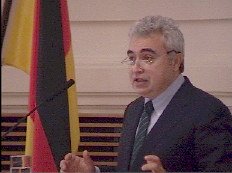The International Energy Agency (IEA) warns that Europe must immediately prepare for the complete loss of Russian gas exports. In addition, the agency calls on governments to take measures to reduce demand. In addition, the IEA chief strongly recommends keeping ageing nuclear power plants in operation.
Fatih Birol is the head of the IEA and he has strong words for the countries of Europe. In his opinion, Russia’s decision to reduce gas supplies to European countries is only the preliminary stage before the complete gas export stop. According to Birol, Moscow is trying to use gas exports as a “bargaining chip” for the war with Ukraine.
“Europe should be prepared in case Russian gas is completely cut off”. Birol said in an interview with the Financial Times.
“The closer we get to winter, the more we understand Russia’s intentions,” he said. “I believe that the cuts are aimed at avoiding Europe filling the reservoirs and increasing Russia’s influence in the winter months”.
Read also: „IEA chief warns Europe to prepare for total shutdown of Russian gas exports” (Financial Times)
IEA warned early on against using gas exports as leverage in the Ukraine war
Funding for the IEA comes primarily from OECD members. Last year, the IEA was one of the first official bodies to publicly accuse Russia of manipulating gas supplies to Europe.
Birol said emergency measures taken by European countries this week to reduce gas demand, such as firing up old coal-fired power plants, were justified given the scale of the crisis, despite concerns about rising carbon emissions.

Shoshone 15:51, 30. Nov. 2008 (CET), Public domain, via Wikimedia Commons
He said the increase in coal-fired generation was “temporary” and would help maintain gas supplies for winter heating. Any additional CO₂ emissions from burning highly polluting coal would be offset by accelerating European plans to reduce dependence on imported fossil fuels and build renewable generation capacity, he added.
IEA chief says current measures by countries do not go far enough
Birol warned, however, that the measures taken so far by European governments probably did not go far enough. Countries would now have to do everything they could to maintain stocks so that they could be filled before the winter months.
“I believe there will be more and deeper demand measures [by governments in Europe] as winter approaches,” Birol said. He added that rationing of gas supplies remained a real possibility should Russia cut exports further.
Many EU countries are already calling out the first stages of contingency plans
After Germany, Austria and the Netherlands, Sweden and Denmark also announced the first stage of emergency plans on Tuesday. But none of these national plans foresee rationing to maintain gas supplies.
Read also: “Habeck declares gas emergency plan alert level“.
According to the consultancy ICIS, Europe has reduced its dependence on Russian gas from around 40 per cent before to about 20 per cent since the invasion of Ukraine. In the process, however, Europe has already exhausted most of the possibilities for diversifying supplies, e.g. liquefied gas from the sea.
IEA chief recommends keeping nuclear power plants online
The IEA chief said countries should try to delay the shutdown of nuclear power plants scheduled for decommissioning. This will allow them to limit the amount of gas used to generate electricity.
Germany has been repeatedly criticised for its decision to continue decommissioning its last nuclear power plants during the energy crisis. Birol did not name any individual country, but said that all countries should consider “postponing the decommissioning [of nuclear power plants] as long as safety conditions are in place.”
Berlin has indicated that it considers the technical and safety hurdles for the continued operation of the plants to be too high.
Read also: “TÜV contradicts Habeck on nuclear power plant lifetime extension“.
Countries should invest in renewable energies and not in oil, coal and gas
Birol’s comments came ahead of the release of a new IEA investment report on Wednesday, which warns that governments are not yet doing enough to encourage investment in renewable energy to curb demand for fossil fuels. Total energy investment is expected to rise 8 per cent this year to $2.4 billion, with growth driven by renewables and higher costs.
Last year, the IEA said that the world did not need to invest in new oil and gas fields if governments wanted to meet their net-zero targets by 2050.
Birol said the world will continue to face dangerous fluctuations in oil and gas prices unless action is taken to significantly reduce fossil fuel consumption. “Unless governments take charge and mobilise substantial resources for a clean energy transition, we will face extreme fluctuations in energy prices,” he said.
While there are some positive signs of growing investment in cleaner forms of energy, in part due to Europe’s desire to overcome its dependence on Russian energy, the global picture is mixed at best, he said.
Developing countries are still heavily dependent on fossil fuels
In developing countries, with the exception of China, investment in renewable energy has not increased in real terms since 2015. Birol also said that developing countries dependent on fossil fuel production need to take advantage of higher prices to diversify their economies.
“The relative weakness of clean energy investment in much of the developing world is one of the most worrying trends,” says the IEA report.
